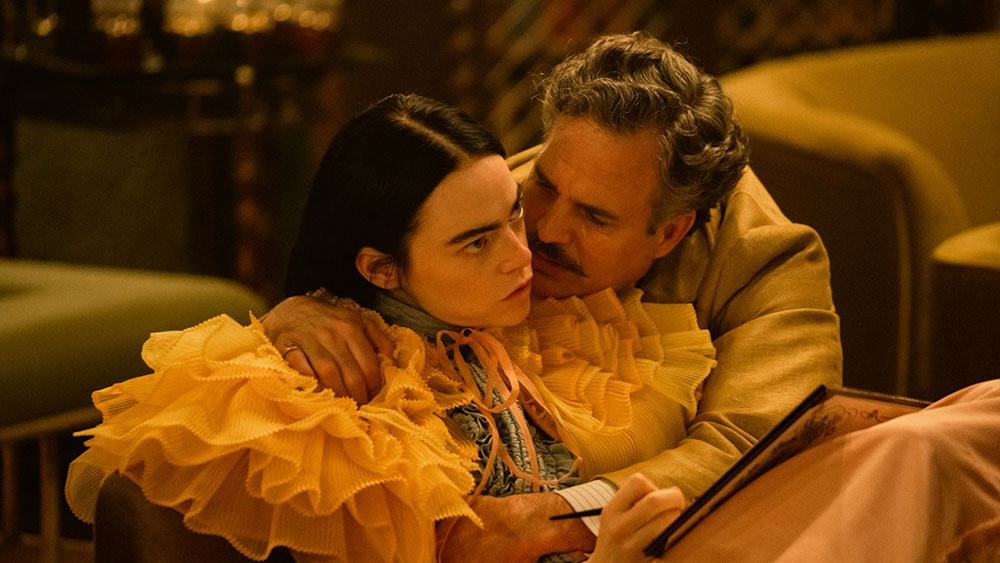Five years after the release of his last feature, The Favourite (2018), Yorgos Lanthimos continues his maximalist era with Poor Things (2023), a phantasmagoric coming-of-age odyssey anchored by a tremendous lead performance by Emma Stone. It’s Lanthimos’s second collaboration with both Stone and screenwriter Tony McNamara, who adapted the screenplay from the Scottish author Alasdair Gray’s 1992 comic fantasy novel.
Emma Stone plays Bella Baxter, a creation of Doctor Godwin Baxter (Willem Dafoe), whom Bella refers to as “God.” A visionary, possibly demented surgeon a la Victor Frankentein, Godwin made Bella by reanimating the corpse of a pregnant woman whom he discovered along the river bank, dead by suicide. He does the only logical thing and transplants the unborn fetus’s brain into Bella’s head, thus fashioning a woman who is physically mature and intellectually infantile, an adult who gets to start their life over from the beginning with no memories, traumas, or social conditioning. He enlists the help of one of his pupils, Max (Ramy Youssef), in studying Bella’s rapid cognitive development. Max is immediately fascinated by Bella, who quickly goes from hobbling around the house like a toddler to becoming curious about the world outside.
It is not long before Bella discovers a broader vocabulary, an interest in exploring the world outside the Baxter home, and how to sexually pleasure herself. She’s also confronted with the fact that, for some reason, such pleasure is meant to be kept behind closed doors. Despite promising her hand in marriage to the gentle Max, she runs away with a sleazy lawyer named Duncan Wedderburn (Mark Ruffalo), who promises to show her around Europe, though she knows that he is a rake who is only good for carnal fun. Thus begins Bella’s journey, full of raunchy exploits and exposure to various characters and philosophies, as well as the full spectrum of earthly delights and terrors that human existence has to offer. Part of what she learns is that, while there are many different flavors of men to sample, each tries to control Bella in his own way. Bella remains her authentic self throughout, saying yes to every experience to see where it leads her—in a sense, using the scientific method that her father/creator instilled in her—unbridled by shame and decorum that she was never socially conditioned to feel.
It’s hard to overstate the achievement of Stone’s performance; she communicates a complete character development—physical, intellectual, sexual, ethical, etc.—and conveys where Bella is at any given moment in her speech and physicality. Her work is bolstered by Holly Waddington’s costume designs, which mix exaggerated Victorian silhouettes with modern fabrics. Bella’s signature look is extreme shoulder coverage, from layers of ruffles to sculptural cocoons: they emphasize her humor as she bumbles around clownishly, barely capable of dressing herself properly, and also provide her with a sort of feminine armor. The anachronistic, futuristic elements of her wardrobe paint her as a woman ahead of her time and as a walking monster in the Victorian age. Her point of view is emphasized by Lanthimos and cinematographer Robbie Ryan’s wide angle fish-eye lens, a tool they also utilized in The Favourite. In that film, the technique had a distancing effect, whereas here it brings us closer to Bella’s perspective as she encounters a big, confusing world for the first time and stumbles through the carnival of it all.
Poor Things is a sweeter film that one might expect from Lanthimos, but it is not without his trademark grotesquerie. A richer, more emotionally fantastic (and bawdy) core defines Poor Things, however, as opposed to the more sterile and pessimistic tone of his earlier work. It’s refreshing to see Lanthimos, an expert at examining characters who are stifled by their surroundings and circumstances with surgical precision—Dogtooth (2009), The Lobster (2015), The Killing of A Sacred Deer (2017)—explore a protagonist who is so gleefully unrestrained.
Poor Things screens this evening, October 12, and on October 15, at the New York Film Festival.



